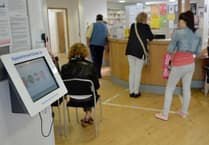PARENTS and carers in Gloucestershire are being advised on what to do if their children develop symptoms of Strep A or Scarlett Fever during the winter.
The local NHS has issued advice amid “understandable concern” about children with Strep A or Scarlett Fever going on to develop serious illness, particularly at a time of year when common winter bugs and viruses are circulating.
Health leaders are reassuring people that Scarlet Fever is usually a very mild illness that can be easily treated with antibiotics, and it is very rare for children to go on to develop the more serious illness known as invasive group A strep (iGAS).
Dr Kate Digby, GP in South Cotswolds, said: “We’ve seen a significant rise in demand for primary care services from people who are worried that their child may have Strep A or Scarlet Fever and we are doing everything we can to respond to all queries in a timely manner.
"It’s important to mention that there are lots of viruses circulating at this time of year that leave children with sore throats, coughs or runny noses, most of which can be managed safely at home with self-care or with advice from the community pharmacy.
"If your child is unwell, we would encourage you to check the advice that the local Paediatric team have put together which outlines the signs to look out for and when you may need to ask for advice from an NHS service.
"This is available on the NHS Gloucestershire website (www.nhsglos.nhs.uk/news/scarlet-fever-advice-for-parents-and-carers).
"We’d like to thank our patients for their continued patience and understanding as we work to prioritise those with the most urgent need.”
Dr Marie Wheeler, Paediatric Consultant and Specialty Director Paediatrics, Gloucestershire Hospitals NHS Foundation Trust, said: “Strep A or Scarlet Fever is usually a mild illness and most children will get better with antibiotics.
“Unfortunately, very occasionally the bacteria gets into the bloodstream and causes a more severe infection.
“We know that this is concerning for parents, but I want to stress that while we are seeing an increase in cases in children across the country, this remains very uncommon.
“We would urge parents and carers to check out the advice on the NHS Gloucestershire website that has been put together by local clinicians.
“This should not only provide some reassurance in many cases but will also give parents and carers clear pointers on when medical help might be needed.”





Comments
This article has no comments yet. Be the first to leave a comment.